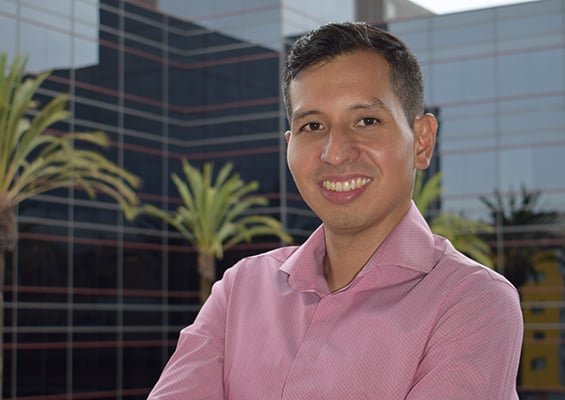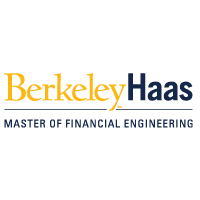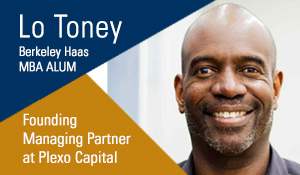Ten years into his career Luis Toro, MFE 14, still relies on lessons learned in his Berkeley Haas Master in Financial Engineering studies, and he retains close ties to the program as a career coach.
Luis traces his interest in financial engineering back to his first job with the banking regulator in his native Peru. “That job was about pricing illiquid bonds using mathematical models. In some ways, I was already doing financial engineering without realizing. And I was reading papers written by Mark Rubinstein, a pioneer in the field and at the time, a Berkeley Haas professor. Financial engineering combines all of my passions and skills: finance, math, statistics, and computer programming.”
The Berkeley Haas program appealed to Luis for its curriculum that balances the theoretical and the practical, taught by faculty who are themselves thought leaders and industry professionals. Luis came to the program interested in the fixed income asset class and has maintained that focus. He appreciates the blend of “numeric sense” blended with financial intuition regarding interest rates and credit risk. Although Luis arrived at Berkeley Haas after Professor Mark Rubinstein’s retirement, he credits Professor Richard Stanton, for teaching a Fixed Income class that continues to influence him.
Today, Luis is a vice president at Franklin Templeton, working in the municipal bond department. “We manage $56 billion of assets in open-end mutual funds and separately managed accounts,” Luis said. “My role is to make sure that the portfolios are diversified across different risk factors, and that our positioning aligns with the investment team’s macroeconomic views and understanding of what we call market technicals, like demand-and-supply dynamics.”
While the numbers are impressive and the work highly technical, Luis sees the impact of his work in broader, more human, terms. “We primarily finance infrastructure projects across different sectors like ports, airports, roadways, schools and universities, hospitals, electric utilities, water and sewer systems, multi-family and single-family housing,” he said. “It is very rewarding to see how the work we do has a positive impact on so many people in so many places.”
"A career path can take time to develop. You need to be curious and explore opportunities.”
In addition to the curriculum and faculty, Luis was drawn to the Berkeley Haas MFE for the quality of its Career Management Services. He knew the statistics: 100% placement for MFE internships and 95% for full-time positions after graduation (2023). What he hadn’t expected was the “personalized attention” and the “extensive industry connections” provided by a dedicated group of career placement specialists.
Going into internship recruiting, Luis benefited from résumé review sessions and a series of mock interviews with staff and alumni. “It was a very intense time, juggling coursework and internship interview preparation,” he recalled. “No vacations obviously, but all of my classmates were in the same situation, and we supported each other. We even managed to have some fun, and we formed strong bonds.”
When he landed his MFE internship at Moody’s Analytics, Luis felt both a “bit scared and very eager.” He and the other Berkeley Haas interns at Moody’s that winter had been “trained to work together, so we helped each other out in preparing and reviewing our projects and presentations. My research project was on default modeling for commercial real estate assets, which called on what we covered in Empirical Methods in Finance and Credit Risk.”
When he accepted a full-time offer from Moody’s after graduation, Luis also worked as a GSI for the Risk Management and the Dynamic Asset Management classes. “Working closely with the students exposed me to perspectives on the subject different from my own,” he recalled. “That broadened my understanding of the field and was a good reminder that there is nearly always more than one approach to a problem.” Among the advice that Luis shares with students is the importance of focusing on the long-term, instead of jumping into short-term opportunities. A career path, he reminds them, “can take time to develop. You need to be curious and explore opportunities.”
That desire to see more than one perspective is behind Luis’s role as a career coach for current MFE students. His involvement is an example of going Beyond Yourself, one of the Defining Leadership Principles that underlie the Berkeley Haas culture. Luis is finding that helping students prepare for internship interviews and giving career advice, is also helping him grow as a person and as a professional. “When we discuss the job market and specific career paths, I can reflect on my own choices and the impact I can have on others,” he said.
One impact Luis would like to see happen is more Hispanic representation in the finance sector. He points first to a few statistics: In the U.S., people of Hispanic origin represent about 19% of the population and 18% of the labor force. Various sources, from the federal government to Forbes, place Hispanic participation in the finance sector at less than 10%. Often far less.
For Luis, this is a question of supply and demand. He explained, “There is a lack of supply of trained and qualified finance professionals, certainly of quants, in the Hispanic population. That can be solved by academic programs making diversity a priority in their recruiting and career services, as Berkeley Haas is doing.” On the demand side, firms also need to embrace diversity as a competitive advantage. Luis continued, “When a firm hires a Hispanic—or anyone, for that matter—from the outside the U.S., companies tend to see only the cost of the visa sponsorship. They should actually see that as an investment, an investment in hiring the best resources and in increasing diversity.”
And in a global economy, Luis said, “Education is key for the development of financial markets in small economies. When people study outside of their home countries, they get the opportunity to see how global markets interact and what makes businesses successful around the world. It provides exposure to see how the finance industry works in other countries and evaluate if that could work locally. That should eventually shape to a better local finance industry.”








